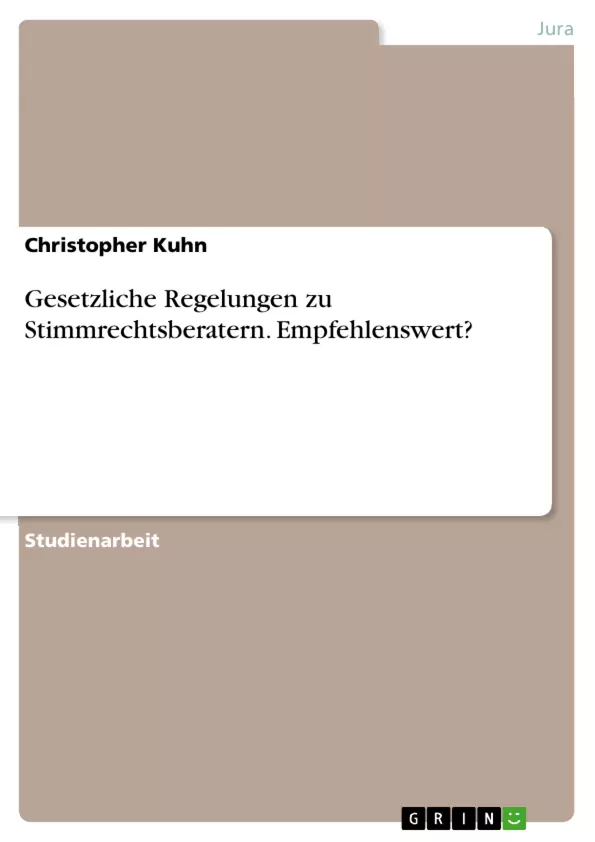Stimmrechtsberater haben sich in den letzten Jahren zu bedeutenden Corporate-Governance-Akteuren entwickelt. Sie sprechen Empfehlungen zur Ausübung des Stimmrechts von (vor allem institutionellen) Aktionären aus. Diese Empfehlungen sind zwar rechtlich unverbindlich, haben aber eine große faktische Bedeutung, da sie von den Aktionären oft unreflektiert befolgt werden. Zudem beraten Stimmrechtsberater in vielen Gesellschaften einen erheblichen Anteil der Anleger und haben so einen bedeutenden Einfluss auf die Geschicke der Gesellschaft: In Deutschland nehmen ca. 80% der ausländischen Investoren (die im Jahr 2009 55,8% aller Anleger ausmachten) die Dienstleistungen von Stimmrechtsberatern in Anspruch. Dazu kommt, dass sich der Einfluss der Stimmrechtsberatungsindustrie auf nur auf wenige Marktteilnehmer verteilt; die größte Bedeutung auf internationaler Ebene haben die Unternehmen ISS (Institutional Shareholder Services) und Glass Lewis & Co. (welche im Folgenden daher als Beispiele dienen); alle übrigen folgen erst mit großem Abstand.
Kritiker befürchten, dass diese große und konzentrierte Macht der Stimmrechtsberater in unangemessener oder sogar missbräuchlicher Weise ausgeübt wird. Dem liegt unter anderem die Überlegung zugrunde, Stimmrechtsberater seien Interessenskonflikten in besonderer Weise ausgesetzt. Diese und andere Bedenken werfen die Frage auf, ob sich gesetzliche Regelungen zu Stimmrechtsberatern empfehlen.
Die vorliegende Arbeit gibt zunächst einen Überblick über die Dienstleistungen der Stimmrechtsberater (B.) und die Gründe, aus denen sie mandatiert werden (C.). Anschließend werden die Ursachen für den großen Einfluss der Stimmberatungsindustrie aufgezeigt (D.) und die Marktsituation erläutert. (E.). Schließlich setzt sich diese Arbeit mit den positiven Aspekten der Stimmberatung (F.) und den Bedenken gegen sie (G.) auseinander und bewertet mögliche Regulierungsstrategien (H.).
Inhaltsverzeichnis
- A. Einleitung
- B. Dienstleistungen der Stimmrechtsberater
- I. Erstellung von Stimmrechts-Richtlinien
- II. Analyse der Tagesordnungen, Abgabe von Stimmrechtsempfehlungen
- III. Corporate-Governance-Beratung und -Rating
- C. Ökonomische Betrachtung der Stimmrechtsberater
- D. Einfluss der Stimmrechtsberater
- I. Gründe für den Einfluss
- 1. Schutz gegen Haftungsgefahren
- 2. Beurteilungsspielräume
- II. Belege für den Einfluss
- I. Empirische Daten
- II. Theorie angreifbarer Märkte
- 1. Hohe Kosten bei Marktzutritt
- 2. Abnahme von Grenzkosten
- 3. Netzwerkeffekte
- E. Marktstruktur
- F. Kritik an der Stimmrechtsberatung
- I. Interessenskonflikte
- II. Mangelnde Differenziertheit der Empfehlungen
- III. Fehlen eines eigenen wirtschaftlichen Risikos
- IV. Unreflektierte Befolgung der Empfehlungen
- V. Intransparenz, fehlende Legitimation
- G. Positive Aspekte der Stimmrechtsberatung
- H. Mögliche Regulierungsstrategien
- I. Verhaltenskodex
- II. Verbesserte Transparenz
- 1. Interne Entscheidungsprozesse
- 2. Interessenskonflikte, Letztverantwortliche im Unternehmen
- 3. Anhaltspunkt: Regelung des § 135 AktG
- III. Verfahrensanforderungen
- 1. Haftung gegenüber Emittenten für Fehler in Stimmrechtsempfehlungen
- 2. Möglichkeit der Kommentierung von Empfehlungsentwürfen durch Emittenten
- 3. Verpflichtung zur Einrichtung eines internen Kontrollsystems
- 4. Nachträgliche Überprüfungspflicht
- IV. Der Aufsicht durch die BaFin unterstellen
- V. Verbot, zugleich den Emittenten über gute Corporate Governance zu beraten
- VI. Wettbewerb intensivieren
- VII. Pflicht zur Offenlegung der in Anspruch genommenen Stimmmberatungsleistungen
- VIII. Verschärfung der fiduziarischen/treuhänderischen Pflichten der institutionellen Investoren gegenüber Endanlegern
- Zusammenfassung
Zielsetzung und Themenschwerpunkte
Die Seminararbeit befasst sich mit der Frage, ob sich gesetzliche Regelungen zu Stimmrechtsberatern empfehlen. Dabei wird die ökonomische Rolle der Stimmrechtsberater sowie deren Einfluss auf die Corporate Governance untersucht. Die Arbeit analysiert die Kritikpunkte an der Stimmrechtsberatung und diskutiert mögliche Regulierungsstrategien.
- Rolle der Stimmrechtsberater in der Corporate Governance
- Ökonomische Aspekte der Stimmrechtsberatung
- Kritikpunkte an der Stimmrechtsberatung
- Mögliche Regulierungsstrategien für Stimmrechtsberater
- Einfluss der Stimmrechtsberater auf die Entscheidungsfindung von Unternehmen
Zusammenfassung der Kapitel
Die Einleitung führt in die Thematik der Stimmrechtsberatung ein und skizziert die Fragestellung der Arbeit. Kapitel B beschreibt die verschiedenen Dienstleistungen, die von Stimmrechtsberatern angeboten werden, wie z.B. die Erstellung von Stimmrechts-Richtlinien und die Abgabe von Stimmrechtsempfehlungen. Kapitel C analysiert die ökonomischen Aspekte der Stimmrechtsberatung und untersucht die Gründe für den Einfluss der Stimmrechtsberater auf die Corporate Governance. Kapitel D beleuchtet die Kritikpunkte an der Stimmrechtsberatung, wie z.B. Interessenskonflikte, mangelnde Differenziertheit der Empfehlungen und die fehlende Legitimation. Kapitel G zeigt positive Aspekte der Stimmrechtsberatung auf. Schließlich präsentiert Kapitel H mögliche Regulierungsstrategien für die Stimmrechtsberatung, um die Transparenz und die Verantwortlichkeit der Stimmrechtsberater zu verbessern.
Schlüsselwörter
Stimmrechtsberater, Corporate Governance, Proxy Advisor, Aktionärsrechte, Interessenkonflikt, Transparenz, Regulierung, Marktstruktur, Einfluss, Ökonomische Betrachtung, Kritik, Positive Aspekte, Mögliche Regulierungsstrategien
Häufig gestellte Fragen
Was machen Stimmrechtsberater (Proxy Advisors)?
Sie analysieren die Tagesordnungen von Hauptversammlungen und geben institutionellen Anlegern Empfehlungen, wie sie ihr Stimmrecht ausüben sollten.
Welche Unternehmen dominieren den Markt der Stimmberatung?
International sind vor allem die Unternehmen ISS (Institutional Shareholder Services) und Glass Lewis & Co. marktführend.
Warum stehen Stimmrechtsberater in der Kritik?
Kritiker bemängeln potenzielle Interessenkonflikte, mangelnde Transparenz, unreflektierte Befolgung durch Anleger und das Fehlen eines eigenen wirtschaftlichen Risikos.
Welche Regulierungsstrategien werden diskutiert?
Diskutiert werden Verhaltenskodizes, Transparenzpflichten über interne Entscheidungsprozesse sowie eine mögliche Aufsicht durch die BaFin.
Welche positiven Aspekte hat die Stimmrechtsberatung?
Sie hilft Anlegern, ihre Aktionärsrechte effizienter wahrzunehmen, bietet Schutz gegen Haftungsgefahren und fördert eine gute Corporate Governance.
- Quote paper
- Christopher Kuhn (Author), 2012, Gesetzliche Regelungen zu Stimmrechtsberatern. Empfehlenswert?, Munich, GRIN Verlag, https://www.grin.com/document/262463



